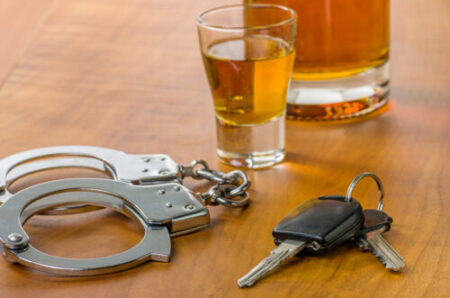If you are arrested for driving under the influence, the procedure can be frightening and complex, especially if it is your first time. Understanding a DUI is important not just for preventing future penalties, but also for dealing with any current charges.
With that said, remember that if you are charged with a DUI, you still have rights and access to certain protections. Continue reading to learn what happens after a DUI arrest and how to best protect yourself in the aftermath.
Before we answer the question of what happens after you get a DUI, let’s understand the meaning of DUI.
What is a DUI?
DUI stands for Driving Under the Influence and refers to operating a vehicle while under the influence of alcohol or drugs (including some prescription medications). Every state in the country has laws against driving under the influence. In certain states, the act is referred to as a DWI (Driving While Intoxicated).
Driving with a blood alcohol concentration (BAC) of 0.08 percent or above is illegal across the country. It makes no difference how intoxicated or influenced you are by the booze.
Two things must be shown to prove that a person is guilty of driving under the influence. The suspect first drove a vehicle. In this context, “driving” refers to controlling and steering the vehicle.
Many others, however, have been arrested for “DUI while parked.” Even if your automobile is idle or turned off, an officer may opt to arrest you if they feel you have the intent to drive.
The second thing that must be shown is that you are under the influence of alcohol or drugs. When you get a DUI, the police must be able to demonstrate that your blood alcohol concentration was 0.08 percent or more, as well as that you were intoxicated.
If your BAC was above this limit but you displayed no evidence of impairment, you may have a better chance of winning your case, albeit this is not guaranteed.
What Happens After Getting a DUI?
#1. You’ll Be Booked
You will be taken to the nearest police station or jail, as with any other crime, and your mugshots and fingerprints will be taken. You can be released instantly if you are allowed to post bail and someone pays for it.
#2. You’ll Have To Appear In The Court
At the time of your arrest, you will be given a ticket or a summons informing you of the date you must appear in court for your DUI hearing.
#3. Your License Will Be Revoked
Depending on the state, if you refuse a field sobriety test, a breathalyzer, or a blood test, your driver’s license will be suspended immediately, or it will be part of your sentence if you are convicted of DUI.
#4. You Can Go Jail
Some people believe that first-time DUI offenders are only sentenced to probation. In reality, jail sentences for first-time DUI offenders are becoming required in an increasing number of states.
Because first-time DUI is a misdemeanor in all states, a conviction might result in up to six months in jail. However, if there are aggravating circumstances, the sentence may be lengthened. However, first-time DUI offenders typically serve shorter jail sentences and spend the remainder of their time on probation or conducting community service.
Probation is another thing you should expect after a DUI. You may also need to wear a SCRAM CAM bracelet. These gadgets detect the presence of alcohol in perspiration.
#5. You’ll Be Fined.
The penalties imposed by courts for DUI convictions differ by state. A first-time DUI offender could face fines of up to $1,800, depending on the state where the violation occurred.
#6. Your Car Insurance Rates Will Increase
Once your provider hears of your DUI arrest and conviction, expect your vehicle insurance costs to skyrocket. The increase could be a few hundred dollars, but insurance premium increases in the thousands of dollars are not uncommon. Finding a car insurance carrier at an inexpensive rate would be difficult if you have a DUI conviction on your record.
However, not all insurance companies react the same way to drunk driving. As a result, if this is your first transgression, your premium payments may not increase significantly.
Following a DUI conviction, you may be required to file an SR-22 form with your state’s Department of Motor Vehicles. An SR-22 certifies that you have the required liability automobile insurance coverage in your state.
Although not all states require SR-22 insurance following a DUI, many do. If yours does, it will notify you by sending you a letter. You will also not have to fill out and file an SR-22; your insurance provider will do it for you.
What Happens To Your Car Insurance After You Get A DUI Table
| Company | Clean record | DUI |
| Erie | $1,274 | $2142 |
| USAA | $1,257 | $2383 |
| State Farm | $1,506 | $2,110 |
| Farm Bureau | $1,696 | $3,107 |
| Mid-Century | $1,976 | $3,104 |
| American Family | $1,832 | $2,810 |
| Progressive | $1,995 | $2,621 |
| MetLife | $2,001 | $4,546 |
| Nationwide | $2,346 | $4,390 |
| Farmers | $2,406 | $4,080 |
| Auto-Owners | $2,998 | $5,906 |
| Travelers | $2,979 | $4,598 |
| GEICO | $2,483 | $5,673 |
| Allstate | $2,669 | $4,944 |
| Note: Average rates are based on non-binding estimates provided by Quadrant Information Services. Your rates may vary. |
What should you do if your auto insurance policy is canceled due to a DUI?
Compare rates from insurers ready to offer you coverage if your vehicle insurance policy is canceled due to a DUI.
If you intend to drive, you must have at least the minimum amount of vehicle insurance required by your state. And if you require auto insurance, you should get the best deal possible. Shopping around can help you do this, even if you have a DUI.
#7. You Must Complete Alcohol and Drug Education
A first-time DUI offender is frequently required by the court to participate in an alcohol and drug education program. Completing this program is usually required before having one’s driver’s license reinstated.
You must attend and pay for hours of drunk driving prevention seminars as part of the program. This program will also analyze your drinking patterns, with a certified counselor doing the evaluation to determine if you have an alcohol abuse disorder.
If the evaluation reveals that you have an alcohol problem, the counselor may prescribe a court-approved alcohol treatment program before restoring your driving privileges.
What Happens When You Get a DUI for the First Time (Penalties)
Criminal charges are distinct from the DMV process of suspending your license.
In California, the penalties for a first-time DUI conviction normally include three years of informal probation, fines of $390 plus “penalty assessments” (totaling around $2000), and completion of a first-offender alcohol program, which comprises a 30-hour class at a cost of around $500.
When placed on probation, there is no mandatory jail time for a first offense. However, if certain aggravating elements are present, such as the presence of a minor child in the car or exceeding the speed limit by 25 miles per hour or 30 miles per hour on a freeway, a jail sentence is feasible.
A first-time DUI sentence may also include obligatory participation in a victim impact panel, community labor, or community service work, which is voluntary.
Following a first-time conviction in California, certain counties (Los Angeles, Alameda, Sacramento, and Tulare) need an ignition interlock device to be installed on your vehicle for four months. This could cost an additional $500.
What Happens When You Get a Repeat DUI
What happens when you get a second-offense DUI is, of course, harsher.
In many counties, prosecutors want to get more than 96 hours in jail. The maximum period is one year.
The suspension period is two years. If you rejected or failed a chemical test, or if you were still on DUI probation at the time of the second offense, your suspension will be unrestricted for the first year.
Booking and Arrest
If you are caught driving while intoxicated, you will most likely not be able to drive yourself home. The cops will almost certainly arrest you on the spot and transport you to the police station. When you arrive, the police will arrest you. This is where the process can become daunting, as a lot will happen at once.
Remember to schedule a free consultation with a DUI defense attorney as soon as possible after being booked. The consultation is a vital step – making the most of your free legal consultation will help you feel sure that you’re working with the proper expert for your individual case and obtaining the best possible outcome.
Test of Sobriety
Everyone in the United States who obtains a driver’s license immediately agrees to “implied consent” rules. This means you’ve agreed to comply with any future requests from law authorities to take a BAC or chemical test to determine your sobriety.
Regardless of your state of intoxication, refusing to take a chemical test on the spot might result in license suspension and other consequences.
It is critical to understand how chemical tests differ from field sobriety tests. While chemical testing is supported by science, field tests are significantly more subjective. A police officer will ask you to complete several activities, such as standing on one foot or walking in a straight line during a field sobriety exam.
The problem with these tests is that they are not as conclusive as chemical testing and can fail even sober people. Many states do not require field sobriety tests, and you can respectfully refuse to do one if you do not want to.
Kansas, for example, recently repealed legislation mandating citizens to complete field sobriety tests. Make sure you are familiar with the laws of your state.
Do You Have a Substance Problem If You Get a DUI?
The legal and financial repercussions of being arrested and convicted for DUI are severe enough, but first-time DUI offenders should consider what it may be telling them about their own health and well-being.
If you are charged with a first-time DUI, it does not necessarily imply that you have a substance abuse problem. It’s likely that you’re only a light to moderate drinker who made the mistake of drinking and driving. Nonetheless, a DUI arrest and conviction is a severe indication that you should reconsider your alcohol consumption.
It would be ideal if you, like the majority of drivers caught for a first-time DUI, changed your drinking and driving habits. However, if you continue to drink and drive despite the negative repercussions, you are raising a large red flag. While it is not conclusive proof of addiction, it is a warning indication that you may have an alcohol issue and will most likely require professional assistance.
How can you reclaim your driver’s license after a DUI?
Completing an education, therapy, or treatment program is the most typical route to regaining your driver’s license after a DUI.
However, finishing one of these programs does not guarantee that you will be able to drive again. This is usually true, but not always.
You may lose your license for years if you are convicted of driving under the influence more than once. Or you can lose it forever. This is because several states have passed “habitual offender” statutes.
Can you lose your car if you get a DUI?
If this is not your first drunk-driving conviction, the judge may order that your automobile be impounded for a period of time. They may even order you to surrender your automobile. Fortunately, this only happens in extreme cases.
Such punishments are far less common than they once were. The primary cause of this is the use of ignition interlock devices or IIDs. These devices prevent drivers from starting their vehicles if their blood alcohol level is too high.
How long will a DUI remain on your record?
The length of time a DUI remains on your record varies by state. A DUI is usually recorded on your driving record for five to ten years in most states. It may, however, remain on your criminal record in perpetuity.
As long as a DUI is on your driving record, you will most likely face increased vehicle insurance premiums. However, if the conviction is removed from your record, your rates should revert to normal.



